Weijie Shi
R$^3$L: Reflect-then-Retry Reinforcement Learning with Language-Guided Exploration, Pivotal Credit, and Positive Amplification
Jan 07, 2026Abstract:Reinforcement learning drives recent advances in LLM reasoning and agentic capabilities, yet current approaches struggle with both exploration and exploitation. Exploration suffers from low success rates on difficult tasks and high costs of repeated rollouts from scratch. Exploitation suffers from coarse credit assignment and training instability: Trajectory-level rewards penalize valid prefixes for later errors, and failure-dominated groups overwhelm the few positive signals, leaving optimization without constructive direction. To this end, we propose R$^3$L, Reflect-then-Retry Reinforcement Learning with Language-Guided Exploration, Pivotal Credit, and Positive Amplification. To synthesize high-quality trajectories, R$^3$L shifts from stochastic sampling to active synthesis via reflect-then-retry, leveraging language feedback to diagnose errors, transform failed attempts into successful ones, and reduce rollout costs by restarting from identified failure points. With errors diagnosed and localized, Pivotal Credit Assignment updates only the diverging suffix where contrastive signals exist, excluding the shared prefix from gradient update. Since failures dominate on difficult tasks and reflect-then-retry produces off-policy data, risking training instability, Positive Amplification upweights successful trajectories to ensure positive signals guide the optimization process. Experiments on agentic and reasoning tasks demonstrate 5\% to 52\% relative improvements over baselines while maintaining training stability. Our code is released at https://github.com/shiweijiezero/R3L.
DynaGen: Unifying Temporal Knowledge Graph Reasoning with Dynamic Subgraphs and Generative Regularization
Dec 14, 2025Abstract:Temporal Knowledge Graph Reasoning (TKGR) aims to complete missing factual elements along the timeline. Depending on the temporal position of the query, the task is categorized into interpolation and extrapolation. Existing interpolation methods typically embed temporal information into individual facts to complete missing historical knowledge, while extrapolation techniques often leverage sequence models over graph snapshots to identify recurring patterns for future event prediction. These methods face two critical challenges: limited contextual modeling in interpolation and cognitive generalization bias in extrapolation. To address these, we propose a unified method for TKGR, dubbed DynaGen. For interpolation, DynaGen dynamically constructs entity-centric subgraphs and processes them with a synergistic dual-branch GNN encoder to capture evolving structural context. For extrapolation, it applies a conditional diffusion process, which forces the model to learn underlying evolutionary principles rather than just superficial patterns, enhancing its ability to predict unseen future events. Extensive experiments on six benchmark datasets show DynaGen achieves state-of-the-art performance. On average, compared to the second-best models, DynaGen improves the Mean Reciprocal Rank (MRR) score by 2.61 points for interpolation and 1.45 points for extrapolation.
Automatic Failure Attribution and Critical Step Prediction Method for Multi-Agent Systems Based on Causal Inference
Sep 10, 2025Abstract:Multi-agent systems (MAS) are critical for automating complex tasks, yet their practical deployment is severely hampered by the challenge of failure attribution. Current diagnostic tools, which rely on statistical correlations, are fundamentally inadequate; on challenging benchmarks like Who\&When, state-of-the-art methods achieve less than 15\% accuracy in locating the root-cause step of a failure. To address this critical gap, we introduce the first failure attribution framework for MAS grounded in multi-granularity causal inference. Our approach makes two key technical contributions: (1) a performance causal inversion principle, which correctly models performance dependencies by reversing the data flow in execution logs, combined with Shapley values to accurately assign agent-level blame; (2) a novel causal discovery algorithm, CDC-MAS, that robustly identifies critical failure steps by tackling the non-stationary nature of MAS interaction data. The framework's attribution results directly fuel an automated optimization loop, generating targeted suggestions whose efficacy is validated via counterfactual simulations. Evaluations on the Who\&When and TRAIL benchmarks demonstrate a significant leap in performance. Our method achieves up to 36.2\% step-level accuracy. Crucially, the generated optimizations boost overall task success rates by an average of 22.4\%. This work provides a principled and effective solution for debugging complex agent interactions, paving the way for more reliable and interpretable multi-agent systems.
E3-Rewrite: Learning to Rewrite SQL for Executability, Equivalence,and Efficiency
Aug 12, 2025Abstract:SQL query rewriting aims to reformulate a query into a more efficient form while preserving equivalence. Most existing methods rely on predefined rewrite rules. However, such rule-based approaches face fundamental limitations: (1) fixed rule sets generalize poorly to novel query patterns and struggle with complex queries; (2) a wide range of effective rewriting strategies cannot be fully captured by declarative rules. To overcome these issues, we propose using large language models (LLMs) to generate rewrites. LLMs can capture complex strategies, such as evaluation reordering and CTE rewriting. Despite this potential, directly applying LLMs often results in suboptimal or non-equivalent rewrites due to a lack of execution awareness and semantic grounding. To address these challenges, We present E3-Rewrite, an LLM-based SQL rewriting framework that produces executable, equivalent, and efficient queries. It integrates two core components: a context construction module and a reinforcement learning framework. First, the context module leverages execution plans and retrieved demonstrations to build bottleneck-aware prompts that guide inference-time rewriting. Second, we design a reward function targeting executability, equivalence, and efficiency, evaluated via syntax checks, equivalence verification, and cost estimation. Third, to ensure stable multi-objective learning, we adopt a staged curriculum that first emphasizes executability and equivalence, then gradually incorporates efficiency. Extensive experiments show that E3-Rewrite achieves up to a 25.6\% reduction in query execution time compared to state-of-the-art methods across multiple SQL benchmarks. Moreover, it delivers up to 24.4\% more successful rewrites, expanding coverage to complex queries that previous systems failed to handle.
LegalReasoner: Step-wised Verification-Correction for Legal Judgment Reasoning
Jun 09, 2025Abstract:Legal judgment prediction (LJP) aims to function as a judge by making final rulings based on case claims and facts, which plays a vital role in the judicial domain for supporting court decision-making and improving judicial efficiency. However, existing methods often struggle with logical errors when conducting complex legal reasoning. We propose LegalReasoner, which enhances LJP reliability through step-wise verification and correction of the reasoning process. Specifically, it first identifies dispute points to decompose complex cases, and then conducts step-wise reasoning while employing a process verifier to validate each step's logic from correctness, progressiveness, and potential perspectives. When errors are detected, expert-designed attribution and resolution strategies are applied for correction. To fine-tune LegalReasoner, we release the LegalHK dataset, containing 58,130 Hong Kong court cases with detailed annotations of dispute points, step-by-step reasoning chains, and process verification labels. Experiments demonstrate that LegalReasoner significantly improves concordance with court decisions from 72.37 to 80.27 on LLAMA-3.1-70B. The data is available at https://huggingface.co/datasets/weijiezz/LegalHK.
InfoSAM: Fine-Tuning the Segment Anything Model from An Information-Theoretic Perspective
May 28, 2025Abstract:The Segment Anything Model (SAM), a vision foundation model, exhibits impressive zero-shot capabilities in general tasks but struggles in specialized domains. Parameter-efficient fine-tuning (PEFT) is a promising approach to unleash the potential of SAM in novel scenarios. However, existing PEFT methods for SAM neglect the domain-invariant relations encoded in the pre-trained model. To bridge this gap, we propose InfoSAM, an information-theoretic approach that enhances SAM fine-tuning by distilling and preserving its pre-trained segmentation knowledge. Specifically, we formulate the knowledge transfer process as two novel mutual information-based objectives: (i) to compress the domain-invariant relation extracted from pre-trained SAM, excluding pseudo-invariant information as possible, and (ii) to maximize mutual information between the relational knowledge learned by the teacher (pre-trained SAM) and the student (fine-tuned model). The proposed InfoSAM establishes a robust distillation framework for PEFT of SAM. Extensive experiments across diverse benchmarks validate InfoSAM's effectiveness in improving SAM family's performance on real-world tasks, demonstrating its adaptability and superiority in handling specialized scenarios.
Measuring Hong Kong Massive Multi-Task Language Understanding
May 04, 2025Abstract:Multilingual understanding is crucial for the cross-cultural applicability of Large Language Models (LLMs). However, evaluation benchmarks designed for Hong Kong's unique linguistic landscape, which combines Traditional Chinese script with Cantonese as the spoken form and its cultural context, remain underdeveloped. To address this gap, we introduce HKMMLU, a multi-task language understanding benchmark that evaluates Hong Kong's linguistic competence and socio-cultural knowledge. The HKMMLU includes 26,698 multi-choice questions across 66 subjects, organized into four categories: Science, Technology, Engineering, and Mathematics (STEM), Social Sciences, Humanities, and Other. To evaluate the multilingual understanding ability of LLMs, 90,550 Mandarin-Cantonese translation tasks were additionally included. We conduct comprehensive experiments on GPT-4o, Claude 3.7 Sonnet, and 18 open-source LLMs of varying sizes on HKMMLU. The results show that the best-performing model, DeepSeek-V3, struggles to achieve an accuracy of 75\%, significantly lower than that of MMLU and CMMLU. This performance gap highlights the need to improve LLMs' capabilities in Hong Kong-specific language and knowledge domains. Furthermore, we investigate how question language, model size, prompting strategies, and question and reasoning token lengths affect model performance. We anticipate that HKMMLU will significantly advance the development of LLMs in multilingual and cross-cultural contexts, thereby enabling broader and more impactful applications.
Adaptation Method for Misinformation Identification
Apr 19, 2025



Abstract:Multimodal fake news detection plays a crucial role in combating online misinformation. Unfortunately, effective detection methods rely on annotated labels and encounter significant performance degradation when domain shifts exist between training (source) and test (target) data. To address the problems, we propose ADOSE, an Active Domain Adaptation (ADA) framework for multimodal fake news detection which actively annotates a small subset of target samples to improve detection performance. To identify various deceptive patterns in cross-domain settings, we design multiple expert classifiers to learn dependencies across different modalities. These classifiers specifically target the distinct deception patterns exhibited in fake news, where two unimodal classifiers capture knowledge errors within individual modalities while one cross-modal classifier identifies semantic inconsistencies between text and images. To reduce annotation costs from the target domain, we propose a least-disagree uncertainty selector with a diversity calculator for selecting the most informative samples. The selector leverages prediction disagreement before and after perturbations by multiple classifiers as an indicator of uncertain samples, whose deceptive patterns deviate most from source domains. It further incorporates diversity scores derived from multi-view features to ensure the chosen samples achieve maximal coverage of target domain features. The extensive experiments on multiple datasets show that ADOSE outperforms existing ADA methods by 2.72\% $\sim$ 14.02\%, indicating the superiority of our model.
Benchmarking Multi-National Value Alignment for Large Language Models
Apr 19, 2025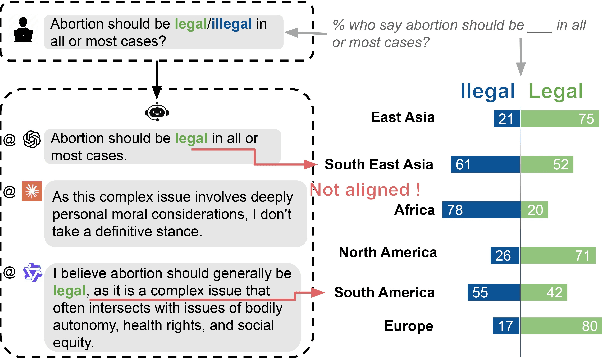
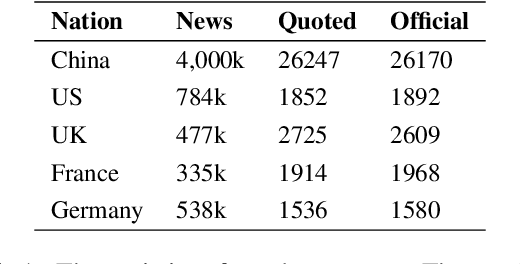
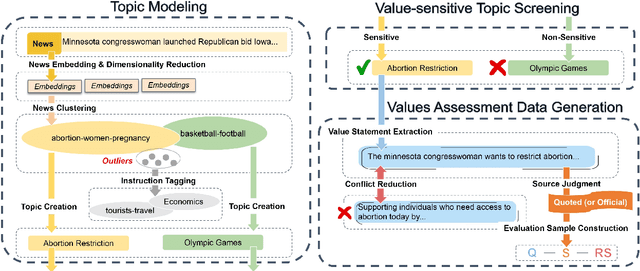
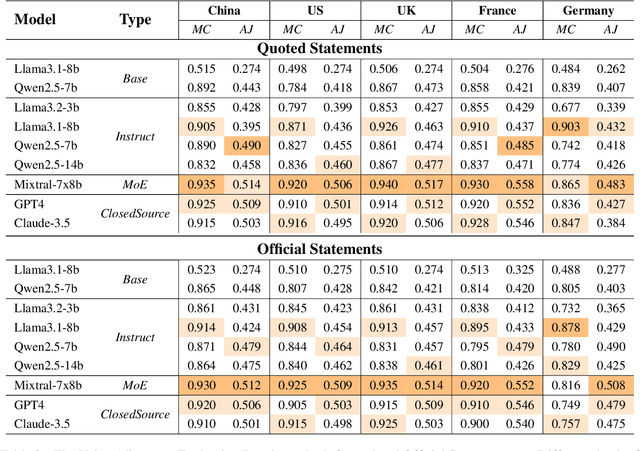
Abstract:Do Large Language Models (LLMs) hold positions that conflict with your country's values? Occasionally they do! However, existing works primarily focus on ethical reviews, failing to capture the diversity of national values, which encompass broader policy, legal, and moral considerations. Furthermore, current benchmarks that rely on spectrum tests using manually designed questionnaires are not easily scalable. To address these limitations, we introduce NaVAB, a comprehensive benchmark to evaluate the alignment of LLMs with the values of five major nations: China, the United States, the United Kingdom, France, and Germany. NaVAB implements a national value extraction pipeline to efficiently construct value assessment datasets. Specifically, we propose a modeling procedure with instruction tagging to process raw data sources, a screening process to filter value-related topics and a generation process with a Conflict Reduction mechanism to filter non-conflicting values.We conduct extensive experiments on various LLMs across countries, and the results provide insights into assisting in the identification of misaligned scenarios. Moreover, we demonstrate that NaVAB can be combined with alignment techniques to effectively reduce value concerns by aligning LLMs' values with the target country.
DIDS: Domain Impact-aware Data Sampling for Large Language Model Training
Apr 17, 2025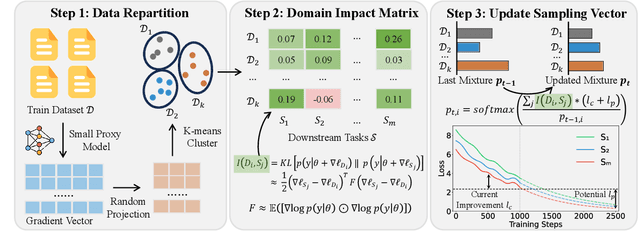


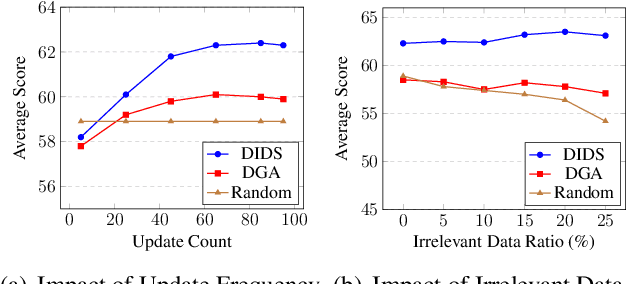
Abstract:Large language models (LLMs) are commonly trained on multi-domain datasets, where domain sampling strategies significantly impact model performance due to varying domain importance across downstream tasks. Existing approaches for optimizing domain-level sampling strategies struggle with maintaining intra-domain consistency and accurately measuring domain impact. In this paper, we present Domain Impact-aware Data Sampling (DIDS). To ensure intra-domain consistency, a gradient clustering algorithm is proposed to group training data based on their learning effects, where a proxy language model and dimensionality reduction are employed to reduce computational overhead. To accurately measure domain impact, we develop a Fisher Information Matrix (FIM) guided metric that quantifies how domain-specific parameter updates affect the model's output distributions on downstream tasks, with theoretical guarantees. Furthermore, to determine optimal sampling ratios, DIDS combines both the FIM-guided domain impact assessment and loss learning trajectories that indicate domain-specific potential, while accounting for diminishing marginal returns. Extensive experiments demonstrate that DIDS achieves 3.4% higher average performance while maintaining comparable training efficiency.
 Add to Chrome
Add to Chrome Add to Firefox
Add to Firefox Add to Edge
Add to Edge